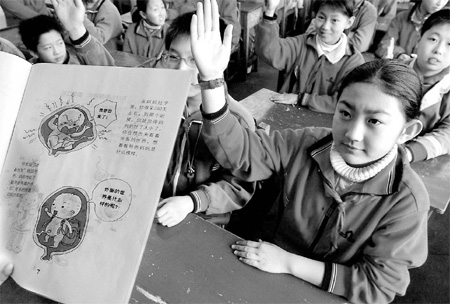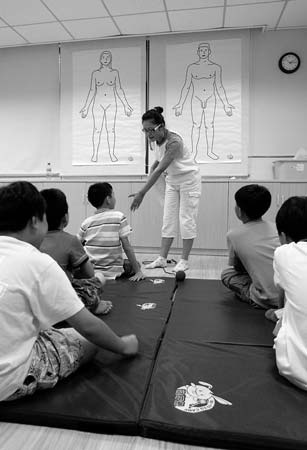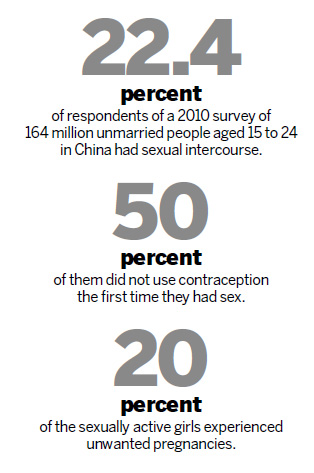Talking sex with your kids
 |
|
Students at a health class in Huanghe Street Primary School in Shenyang, Liaoning province. Yang Xinyao / for China Daily |
 |
|
Boys aged between 8 and 12 learn about sex at a Shanghai summer camp. Zhang Dong / for China Daily |

A bold initiative to introduce sex education in primary schools is being viewed as a sign of progress by many in a nation where traditionally the subject is taboo. Yu Fei of China Features reports.
When Liu Yajun, a Beijing primary school teacher in her 40s, first tried to talk about reproductive organs with her 11-year-old students, she found she was just too embarrassed to speak. Traditionally, sex has been a taboo subject in China. One is not supposed to talk about it openly, especially with children. In fact, when children ask, "Where did I come from?", many parents will say, "You were picked up from a trash can".
There are no specific sex education courses in Chinese public schools. Although a high school course called "physical hygiene" purports to educate youngsters about their reproductive organs, most students are simply left to read the textbooks on their own.
But a dozen primary schools in Beijing, including the one affiliated to Beijing Medical University where Liu teaches, are trying to make breakthroughs in sex education.
Liu, now armed with training in sex education, says, "We show videos about physiological changes in adolescence to our boys and girls separately. When we show the girls' movie, the boys are curious and watch through a window. Children really want to know about it." In a sex education class in Hepingli No 1 Primary School, a game is on in which boys, playing sperms, vie with each other to overcome obstacles to meet the girls, playing ova. Through the game, they are taught how a sperm meets and fertilizes an ovum.
Sun Yunxiao, deputy director of China Youth Research Center, says, "While promoting sex education in primary schools is an important step forward, China lacks the teachers, textbooks and modern concepts it needs to improve sex education."
With better nutrition, Chinese children are hitting puberty at an earlier age. Researches put the average age of puberty among Chinese girls at 9.2.
"Sex education should start before pubertal development. Children won't know how to protect themselves if they don't understand their bodies and lack knowledge about sexual health," Sun says.
A 2010 survey of 164 million unmarried people aged 15 to 24 in the country, by the Population Research Institute at Peking University, showed that 22.4 percent of respondents had sexual intercourse, but half of them did not use contraception the first time they had sex.
Of the sexually active girls, more than 20 percent had experienced unwanted pregnancies. And 91 percent of these had ended in abortions. Only 4.4 percent of those surveyed were found to be knowledgeable about sexual health, while 14.4 percent knew how to prevent the transmission of AIDS/HIV.
Zong Chunshan, director of the Beijing Youth Law and Psychology Consultancy Center, says a third of the phone calls his center now receives are about sexual health, a 25 percent increase over the past two decades.
"Earlier, the questions used to concern things like masturbation. But in recent years, there have been more questions about sexual relations, pregnancy and abortion," says Zong, who is also a council member of the Beijing Sex Education Association.
"About a sixth of the calls we receive on our hotline are actually obscene calls. The callers, mostly in their early 20s, are not trying to consult with us, but trying to satisfy abnormal fantasies, which are a typical outcome of poor sex education," Zong says.
"The greatest impact of a lack of sex education is the belief that sex is a dirty thing. If sexual feelings are repressed and do not find a healthy outlet, they can lead to abnormal and morbid desires."
In China, parents and schools focus on their children's academic records, but often fail to take their psychological needs into account. For instance, children are almost always forbidden from engaging in any kind of romantic relationship until they graduate from high school - and even then, parents often attempt to keep a strong grip on their child's behavior.
At the same time, reports of teenage pregnancies are increasing. More teachers and parents are becoming aware that it is important to promote sex education.
"At present, there is no structured curriculum or even appropriate teaching materials for sex education in primary and middle schools," says Zhang Meimei, director of the Sex Education Research Center under Capital Normal University.
"It's like fighting a fire. Only when there are some accidents or problems, a lecture or consultation is held in schools. But there is no regular class for sex education," Zhang says.
Some non-governmental organizations, including those from abroad, have been trying to introduce Western concepts of sex education to China. But experts doubt the feasibility of these methods.
Sun, of the China Youth Research Center, says every nation has its own cultural traits. Sex education videos from Western countries, that are very open and direct, are not suitable to be shown in China, he says.
In order to find the appropriate method in China, Zhang's center worked with the Beijing Municipal Education Commission to launch a pilot program in 2009, under which a sex education guideline for students between the ages of 6 and 18 was drafted and tested in the city's primary and middle schools.
Just 10 primary schools and 20 middle schools participated in the program's first stage. However, 48 primary and middle schools joined the program in 2011.
"China doesn't have teachers with a sex education background. The teachers participating in the program come from a variety of disciplines, such as biology, psychology and mathematics. We use our sex education guideline to train these teachers. They are then allowed to find a more specific teaching method, suited to their personal styles," Zhang says.
Liu, the primary school teacher, says, "In the beginning, I had a superficial understanding sex education. I thought it was more about physiology, and felt embarrassed to talk about it with the kids. But after being trained by experts, I learnt that sex education allows us to teach our students to be healthy, happy and confident people.
"I think it has had a positive impact. The boys, for example, have become more comfortable with their voice change, recognizing it as a sign of growing up."
However, promoting sex education in primary schools has drawn protests from some parents. They think it's too early to talk about the subject with their children.
One textbook to be used in one of the city's primary schools sparked much controversy. Parents criticized what they called its "pornographic" illustrations.
An online survey conducted by ifeng.com, a popular Chinese Web portal, showed that although about 47 percent of those surveyed thought the textbook was a sign of progress in China, more than 37 percent worried it could produce undesirable results.
"Most of today's parents received no sex education when they were growing up. It's understandable that they have these worries. But international experience shows that children who have received sex education are less likely to engage in sexual behavior, as they are less curious about it and have a more serious attitude about it," Sun says.
"Although sex education is still in an exploratory stage in China, it's better than not having any, " Zong says.























